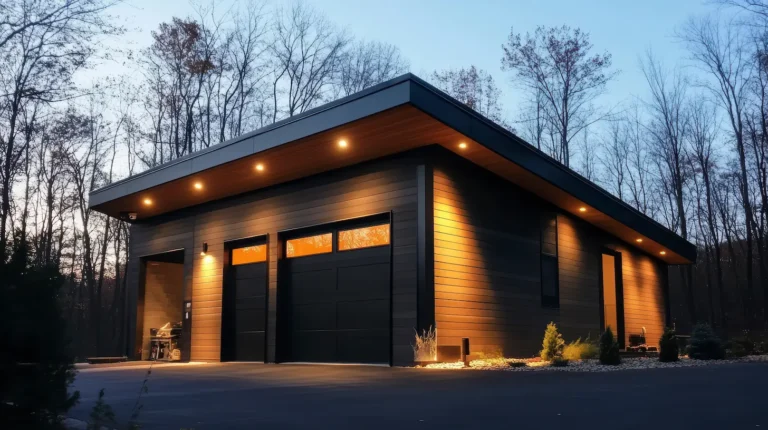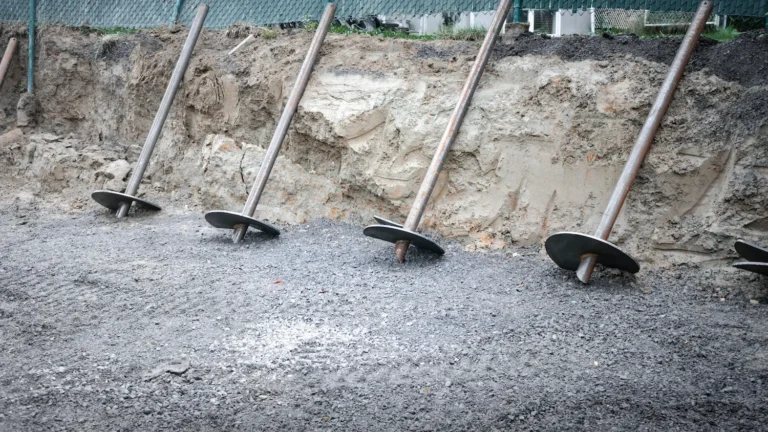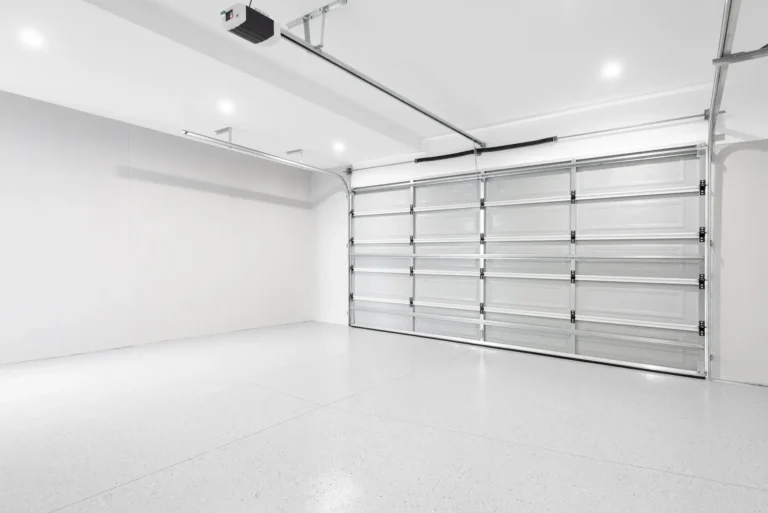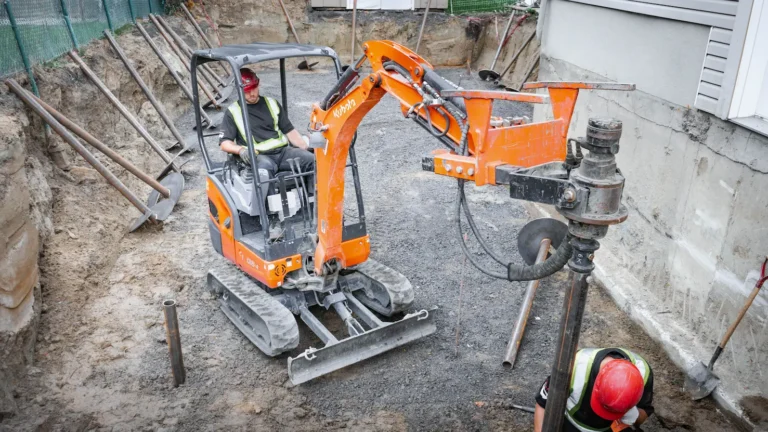Summary
What you need to know about choosing screw piles for garages is that they’re quickly installed, durable, and a truly versatile foundation option suitable for any garage. While they don’t completely replace concrete slabs, they support them perfectly, making your garage build cleaner and longer-lasting.
Can you use screw piles for a garage?
Undoubtedly, yes! Screw piles are one of the greatest options for supporting a garage. Whether it’s a small single-car structure or a larger two-car setup, the answer is the same.
Screwed directly into the ground, these steel foundations are providing immediate stability without the need for extensive work. Compatible with a variety of soil types, including clay, sand, and rock, they are especially useful on uneven or sloped lots. Who would have thought?
When choosing this option, many homeowners are surprised at how quickly a garage sits on a stable, ready-to-use base. To learn more about why this method is gaining popularity for garages everywhere, we invite you to keep reading.

Advantages - Why install screw piles for your garage?
Screw piles are quickly becoming one of the top choices for garage foundations, and for very good reasons. While you won’t completely replace concrete, since most garage floors are still made of it, they work perfectly together.
Combining strength, speed, and convenience, it gives homeowners a reliable base with less trouble than using traditional concrete alone. Here’s why they stand out:
- Quick and easy installation
- Clean and intact yard (hard to believe but true)
- Screw piles adjust to the land
- Made of galvanized steel, they resist corrosion
- Handle heavy loads for years
- Reusable and eco-friendly
With all these advantages, can you see why screw piles are gaining popularity? Strong and trustworthy, they make your garage construction project smoother and more cost-effective from start to finish.
Why choose screw piles over other types of foundations to build a garage?
When it comes to building a garage, the foundation is everything. And as you may know, screw piles stand out. Why? They simply check all those boxes.
- Your garage foundation is most likely to be ready in a single day.
- You won't have to deal with dirty land.
- The installation is possible in any season, yes, even in the middle of winter.
- They adapt to any soil and lot with ease.
- They’re built to hold up for decades, more than 75 years to be precise.
Over the years, they have evolved to become a great alternative to traditional foundations. Thanks to their versatility and high performance. Unlike concrete footings that require excavation, forms, and days of curing, screw piles are installed in a few hours. After that, there is no waiting time.
Since you can start building your garage right away, there is literally no excuse to have your project delayed.

When is it better to install screw piles rather than just a concrete foundation?
We know what you think. Why would I choose screw piles for a garage? Do you think I’ll install a wooden floor? The truth is that for a garage, screw piles aren’t here to completely replace your concrete slab. They’re here to hold it up and shine in situations where traditional concrete footings struggle:
- Uneven ground
- Poor soil conditions
- When you want to build in winter without waiting for the frost to disappear
Because they’re installed deep under the frost line, screw piles prevent shifting and settling that can crack concrete over time. To help you understand better, think of them as invisible muscles beneath your garage. They keep everything solid and level for years to come.
Disadvantages or limitations of screw piles for garages
In all honesty, no foundation system is perfect, and screw piles are no exception. While they work wonders in many situations, there are a few things to keep in mind.
- They need to be installed by professionals with the right equipment, it’s absolutely not a weekend DIY project.
- In areas with extremely soft or swampy soil, longer or reinforced piles are going to be needed, which will increase the price.
- And while they’re built to last, they can’t magically fix poor site drainage, so water issues still need to be addressed.
Fortunately, with the support of an experienced team, these limitations are easy to plan for and rarely outweigh the benefits.
What types of garages can be supported by screw piles?
Screw piles support just about any garage design you have in mind. Whether it’s an attached garage that blends into your home or a detached garage set further back on your property, screw piles provide the stability you need.
They are equally at ease under a single-car garage, a double, or even a three-car setup with extra storage space. Because they are precisely positioned, screw piles adapt to different garage layouts without major excavation.
From small workshops to large vehicle shelters, they offer a strong, levelled base.

How many screw piles are needed to support a garage?
To build a garage foundation, the number of screw piles needed depends on the following:
- Size
- Weight
- Design
- Soil
A small single-car garage only needs a handful, while larger double or triple garages require more to handle the extra load. Installers usually space piles about 8 to 10 feet apart, placing them at corners, along the perimeter, and under critical load points.
Since there’s no universal number, a professional assessment is essential to calculate the exact amount and placement. This step is crucial as it ensures the stability of your garage.
Installation process of screw piles for garages
When done by experienced professionals, installing screw piles for a garage is an incredibly fast process. Here are the steps:
Step 1. Project evaluation and site inspection
The installer checks soil conditions, garage plans, and access for machinery.
Step 2. Marking pile locations
Exact spots are measured and marked to match the garage layout.
Step 3. Driving the piles
A hydraulic machine screws the steel piles deep into the ground.
Step 4. Height adjustments
Each pile is adjusted to ensure a perfectly level base.
Step 5. Installing pile caps
These connect the piles to the garage’s frame or concrete slab.
Step 6. Final verification
The installer double-checks alignment, spacing, and stability.
Now that everything’s done, you are ready to build your garage. You don’t even have to wait hours, nor a day or two.

What preliminary verifications are required before installation?
Before installing screw piles for your garage, a few important checks ensure the job goes as planned. First, the soil needs to be assessed to determine its type, density, and depth of stable layers. This tells installers how deep the piles should go.
Next, the exact garage dimensions and load points are reviewed so piles can be placed for maximum support. Utility line locations, such as water, gas, and electricity, must be identified to avoid costly damage during drilling.
Finally, access for the installation equipment is verified. Luckily, there aren’t many cases where tight spaces allow the machinery to pass. Overall, taking the time for these verifications means your foundation will be safe and stable.
How much does it cost to install screw piles for a garage?
On average, the price per pile runs between 200$ and 300$, which includes both the pile itself and the installation. Does it sound high? Keep in mind, these aren’t your typical hardware-store piles. They’re patented, engineered, and approved by Canadian authorities, so you’re getting the best quality available on the market.
However, with that being said, you have to keep in mind that every garage is different. Size, layout, and soil conditions all affect the total number of piles required, so your final price will vary accordingly.
You don’t have to guess or worry about it. Getting a precise quote is easy, fast, and completely free. No fees, no obligations. At the head of a major screw pile installers network, we are here to provide you with real numbers.
Do you want to know exactly how much your garage foundation will cost? Ask for quotes right here, right now, and get the clarity you need.
What factors influence the price of a screw pile garage foundation?
To come up with a price, our partners consider multiple factors such as:
- Garage size and weight
- Soil type
- Pile depth and length
- Access and site conditions
- Local labor rates
If you are ready to receive accurate quotes, remember that it’s important to give as much information as possible about your garage and site.
What homeowners say about screw piles for garages
Don’t just take our word for it! Let’s see what our past clients are saying about screw piles for their garages.
“We have a sloped lot, so I was worried about concrete cracking. Screw piles were perfect. Everything feels like it’s built to last a lifetime.”
Sophie R., Laurentides
“I was amazed at how fast the installation went. Our two-car garage was ready in a day, and the yard stayed completely intact.”
Marc L., Quebec City
“Getting quotes was simple and free, and the installers handled everything professionally. I didn’t realize how much time and money we’d save. For anyone building a garage, I highly recommend it!”
Alex D., Laval

FAQ - All you need to know about screw piles for garages
How long will screw piles last under a garage?
When installing screw piles under a garage, homeowners don’t have to plan on redoing it for another 75 years +. Unlike other materials, galvanized steel won’t shift or crack over time. They’re the kind of foundation you install once and forget about, a real set it and forget it solution for your garage.
Do screw piles require maintenance to ensure longevity?
No. The beauty of it is that once installed, they’re basically invisible under your garage and designed to withstand soil pH, movement, frost, and moisture. However, to behave that way, high-quality piles and a proper installation are, of course, needed. After that, there’s no regular upkeep required. It’s a true low-maintenance foundation.
Are screw piles cheaper than concrete for a garage foundation?
In most cases, yes. While the per-pile cost might seem high at first, you save on excavation, formwork, curing time, and labor compared to a traditional concrete foundation.
There’s also less disruption to your yard and faster installation, which saves money, especially if you’re on a tight schedule. Over the life of your garage, fewer repairs and less risk of settling cracks mean long-term savings. So while it might feel like a bigger upfront investment, screw piles often end up being a more economical choice for your garage.
Are screw piles suitable for any type of soil conditions and incline?
No matter if your lot is flat, rocky, or on a slope, screw piles deliver a stable and solid foundation. They can be installed in clay, sand, gravel, and even some rocky soils. Their ability to reach deep, stable layers of soil ensures your garage won’t settle unevenly.
Of course, extreme soil conditions require a professional assessment, but for most homeowners, screw piles provide unmatched versatility and stability for garages of all shapes and sizes.
Can screw piles be installed under an existing garage?
Yes, they can! Installing screw piles under an existing garage requires skilled professionals and the right equipment, but it’s possible without demolishing your structure. The piles are driven into the ground, and then the garage can be carefully lifted or adjusted onto the new support.
This approach is used to fix settling issues or reinforce an older foundation, giving your garage a second life. Minimally invasive, it’s a smart solution for people looking to strengthen or stabilize a garage without starting from scratch.
Receive free quotes for your garage screw pile foundation!
Do you need more information, explore the feasibility of your project, or want to know exactly how much your garage foundation will cost? Our verified and trustworthy partners are available to answer all of your questions and send customized quotes your way.
- If you are ready to explore this type of foundation, you only have to fill out our form. It is free, only takes about 2 minutes, and there is no obligation for you.
Give your garage the strong foundation it deserves!


